|
|
|
Sort Order |
|
|
|
Items / Page
|
|
|
|
|
|
|
| Srl | Item |
| 1 |
ID:
125302
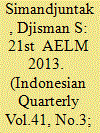

|
|
|
|
|
| Publication |
2013.
|
| Summary/Abstract |
Aspiring to serve the world as inclusive and sustainable growth is perhaps the most attractive of all the messages and intents that the 21st APEC Economic Leaders` Meeting (21st AELM) in Bali spread through its lengthy Bali Declaration. Given European Union`s incapacitation in the wake of austere policies made necessary by structural government deficits and other growth depressors, including aging, sizeable expansionary impulses that can pull the world economy out of descending trend in the short run can only come from APEC economies. Even through the united states (US) and to a lesser extent Japan are tightly social security expenditure, increase taxes and or sell assets in order to get back to a necessary fiscal balance, APEC can count on China, Southeast Asia, Republic of Korea (ROK) , and Russia as sources of stimulatory impacts on the world economy.
|
|
|
|
|
|
|
|
|
|
|
|
|
|
|
|
| 2 |
ID:
070892
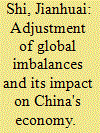

|
|
|
| 3 |
ID:
113155
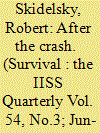

|
|
|
|
|
| Publication |
2012.
|
| Summary/Abstract |
Since its collapse in autumn 2008, the world economy has gone through three phases: a year or more of rapid decline; a bounce back in 2009-10, which nevertheless did not amount to a full recovery; and a second, though so far much shallower, downturn in the developed world over the last year.
|
|
|
|
|
|
|
|
|
|
|
|
|
|
|
|
| 4 |
ID:
114869


|
|
|
|
|
| Publication |
2012.
|
| Summary/Abstract |
In recent years there has been much debate about whether the activities of missionaries were an act of religious altruism or a medium of cultural expansion and a preparation for political involvement. The American expedition occurred during the early years of modern Western - as yet mainly British, French and Russian - penetration of the Ottoman realms. The immediate effect was to draw the East into the rapidly expanding capitalist world economy while containing the ambitions of rival powers in order to prepare for the Sublime Porte's ultimate dismemberment. This phase of missionary activity represented something extraordinary, because the Americans were attempting to impose their kind of Christianity, namely, Protestantism, on communities which had been Christian well before the Christian American identity came into being. This article examines the formation of the American Protestant missionaries' activities in Anatolia; missionaries' evaluations of events within the Empire, and their relations with the Armenians will be the focus of the analysis. In other words, attention will be drawn to how the missionary enterprise fostered Armenian nationalism by introducing Western political ideals and promoting Armenian cultural identity through education and the press discussed. Rather than examining the Armenian Question, this paper will trace the genesis of Armenian nationalism through the Boards' Protestant Anatolia vision.
|
|
|
|
|
|
|
|
|
|
|
|
|
|
|
|
| 5 |
ID:
111937
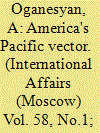

|
|
|
|
|
| Publication |
2012.
|
| Summary/Abstract |
"THE FUTURE OF POLITICS will be decided in Asia, not Afghanistan or Iraq, and the United States will be right at the center of the action," U.S. Secretary of State Hillary Clinton stated in her article which appeared in the November 2011 issue of Foreign Policy under a powerful title "America's Pacific Century." The Editors were even more explicit when they put "Our Pacific Century" on the cover.
The American diplomat has gone much further than mere statements of the region's impressive economic growth which shifted the center of world economy to Asia. She has made it clear that America intends to dominate the APR. Diplomatically the formula "America's Pacific Century" is highly ambiguous; placed in the context of the coming presidential elections it looks like a gauntlet thrown down to that part of the American opposition that talks about "coming home" to address the economic crisis and financial instability.
|
|
|
|
|
|
|
|
|
|
|
|
|
|
|
|
| 6 |
ID:
068217
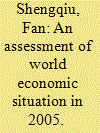

|
|
|
| 7 |
ID:
106476
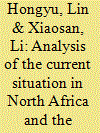

|
|
|
| 8 |
ID:
107214
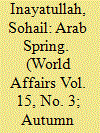

|
|
|
| 9 |
ID:
112276
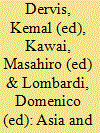

|
|
|
|
|
| Publication |
Washington, D C, Brooking Institution Press and Asian Development Bank Insititute, 2011.
|
| Description |
viii, 200p.
|
| Contents |
Includes bibliographical references and index.
|
| Standard Number |
9780815704218
|
|
|
|
|
|
|
|
|
|
|
|
Copies: C:1/I:0,R:0,Q:0
Circulation
| Accession# | Call# | Current Location | Status | Policy | Location |
| 056410 | 337.5/DER 056410 | Main | On Shelf | General | |
|
|
|
|
| 10 |
ID:
132005
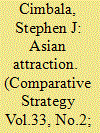

|
|
|
|
|
| Publication |
2014.
|
| Summary/Abstract |
The United States' military-strategic pivot toward Asia is motived by concerns about a rising China, about the increased significance of Asia on the world economic and political stages, and about the growing risks of nuclear proliferation and nuclear first use in that region. Nuclear Asia already numbers five acknowledged or de facto nuclear weapons states among its members: Russia, China, North Korea, India, and Pakistan. Failure to reverse North Korea's nuclear weapons status or political distrust among other powers may increase the number of Asian nuclear weapons states (including states with prospective nuclear-missile reach into Asia) to eight, creating an Asian-Middle Eastern nuclear arms race that defies containment. On the other hand, an alternative presents itself, in the form of a multilateral nuclear arms reduction agreement that would create three tiers of accepted nuclear weapons states and bar the door to new admits.
|
|
|
|
|
|
|
|
|
|
|
|
|
|
|
|
| 11 |
ID:
078455
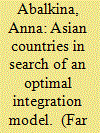

|
|
|
| 12 |
ID:
114971
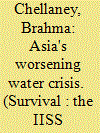

|
|
|
|
|
| Publication |
2012.
|
| Summary/Abstract |
Of all the natural resources on which the modern world depends, water is the most critical. There are replacements for oil, but there is no substitute for water. It is essential to produce virtually all the goods in the marketplace, from food to industrial products, as well as to produce electricity, to refine oil and gas, and to mine coal and uranium. Put simply, water scarcity and rapid economic advance cannot go hand in hand. Yet water scarcity now affects more than two-fifths of the people on Earth, and by 2025 two-thirds of the global population is likely to be living in water-scarce or water-stressed conditions. Water-scarce nations face very tough choices and serious socioeconomic consequences. And the majority of the world's people living in water-related despair will be in Asia.
|
|
|
|
|
|
|
|
|
|
|
|
|
|
|
|
| 13 |
ID:
130606
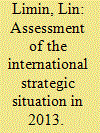

|
|
|
|
|
| Publication |
2014.
|
| Summary/Abstract |
The international strategic situation in 2013 appeared very calm than ever before and had no outstanding features; the fact of its having no special feature was its de?ning characteristic. Although 2013 could be
characterized as a normal year, the international strategic situation has undergone some profound changes. One of the most important is that the United States may have quietly given up its role of the "world police." The 'post-American era' has begun to arrive without attracting much attention in the international community. Many of these profound changes, including the long-term downturn of the world economy, the ongoing process of the West 's decline and the rise of the East, the endless chaos in the Middle East, readjustments in the international order and great power relations, and the evolving relationship between China and the U.S. are all closely related with this dawning of the 'post-American era.' Thus, the 2013
international strategic situation could be seen as holding the seeds of greater change than has been seen since the collapse of the Soviet Union in 1991.
|
|
|
|
|
|
|
|
|
|
|
|
|
|
|
|
| 14 |
ID:
130440
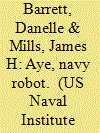

|
|
|
| 15 |
ID:
174919
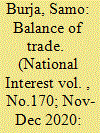

|
|
|
| 16 |
ID:
133191
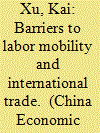

|
|
|
|
|
| Publication |
2014.
|
| Summary/Abstract |
This paper quantitatively evaluates the potential impacts of removing China's Hukou system on the world economy. By denying migrant workers the right to health benefits and housing, China's Household Registration (Hukou) system presents a significant distortion to the Chinese labor market that discourages the reallocation of its labor from agriculture to non-agriculture. I find that the elimination of Hukou could increase China's real income per capita by about 4.7%. Moreover, although for most countries the impact of removing Hukou is modest (less than 1% changes in real income per capita), substantial changes in real income could take place for China's small neighboring economies. For example, the decreases in real GDP per capita are 2.7%, 3.2%, and 4.1% for Bangladesh, Sri Lanka, and Vietnam, while Thailand stands to enjoy a 3.8% increase in its income.
|
|
|
|
|
|
|
|
|
|
|
|
|
|
|
|
| 17 |
ID:
166286
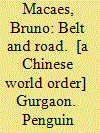

|
|
|
|
|
| Publication |
Gurgaon, Penguin Random House India Pvt. Ltd., 2019.
|
| Description |
xii, 227p.hbk
|
| Standard Number |
9780670092307
|
|
|
|
|
|
|
|
|
|
|
|
Copies: C:1/I:0,R:0,Q:0
Circulation
| Accession# | Call# | Current Location | Status | Policy | Location |
| 059652 | 337.5105/MAC 059652 | Main | On Shelf | General | |
|
|
|
|
| 18 |
ID:
096166
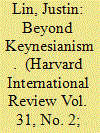

|
|
|
| 19 |
ID:
130354
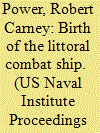

|
|
|
| 20 |
ID:
152590
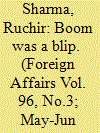

|
|
|
|
|
| Summary/Abstract |
The global recovery from the Great Recession of 2009 has just entered its eighth year and shows few signs of fading. That should be cause for celebration. But this recovery has been an underwhelming one. Throughout this period, the global economy has grown at an average annual pace of just 2.5 percent—a record low when compared with economic rebounds that took place in the decades after World War II. Rather than rejoicing, then, many experts are now anxiously searching for a way to push the world economy out of its low-growth trap. Some economists and investors have placed their hopes on populists such as U.S. President Donald Trump, figuring that if they can make their countries’ economies grow quickly again, the rest of the world might follow along.
|
|
|
|
|
|
|
|
|
|
|
|
|
|
|
|
|
|
|
|
|